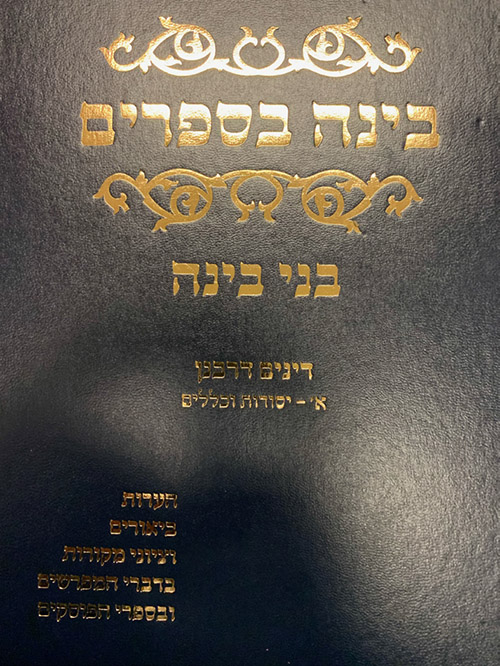
I will never forget my introduction to Rav Daniel Feldman. We were returning from the NORPAC mission to Washington, D.C., in May 1999 when a dozen people asked me to organize shiurim for the five-hour bus ride to Teaneck. There were many Torah-knowledgeable people on this trip, and the talks proceeded beautifully.
Then-TABC senior Ariel Bayewitz whispered in my ear that I should ask Rav Daniel Feldman to deliver a shiur. Rav Feldman had recently been ordained at Yeshiva University-RIETS, but I was not yet aware of his prodigious talent. Nevertheless, I asked him to deliver a talk on whatever topic he wished. He then proceeded to give a 45-minute shiur on the subject of Lifnei iver lo titein michshol, the prohibition to facilitate the violation of Torah law.
The other listeners and I were stunned. I was shocked to hear such astonishing breadth and clarity delivered in such a pleasant manner. Rav Feldman interspersed his talk with witty side notes that helped sustain our interest. He revealed a never-ending array of facets of lifnei iver that made us realize that the topic is richer than I had ever imagined. An example is the Minchat Chinuch’s classifying the facilitation of a Jew violation of a rabbinic prohibition as a Torah-level prohibition. Helping someone violate any halacha might run afoul of the Torah prohibition to offer ill-suited advice (“etza she’ena hogenet lo”).
There was not a shred of arrogance in the presentation. Instead, a vibe of genuine and healthy humility characterized the talk. By the end of the shiur I realized that I was listening to an emerging gadol hador, a leading Torah light of the generation.
Fortunately, Rav Feldman’s talents extend not only to an oral delivery but also to the written word. An extraordinarily talented and prolific writer, Rav Feldman has authored more than a dozen well-received sefarim in Hebrew and English. Each time I delve into Rav Feldman’s works I relive the experience of that enjoyable bus ride of May 1999. I am struck by the incredible breadth and depth of every issue that Rav Feldman addresses. Moreover, the topics are presented in an attractive and even enticing manner, making it difficult to put down Rav Feldman’s writings.
My friend/student Rav Craig Berkowitz most accurately describes Rav Feldman as the “Ashkenazic Rav Ovadia Yosef.” Rav Yosef’s essays are renowned for being virtual encyclopedia entries on each topic he addresses. From the well-known authorities to the more obscure authors, Rav Ovadia does not miss a beat. The same applies to Rav Feldman. His citations display a most remarkable range of authorities. In an age of an explosion of Torah works, Rav Feldman collects pretty much everyone and anyone who has competently addressed a particular topic. Today, even advanced scholars struggle to keep pace with the vast volume of high-quality Torah generated worldwide. To the rescue comes Rav Feldman, who beautifully organizes the many opinions and opens a portal allowing us to access the full richness of contemporary Torah scholarship.
A few weeks ago I obtained two recently released volumes of Binah BeSefarim, the name of Rav Feldman’s series of Hebrew volumes. One work was on Chanukah and the other on rabbinic laws. I highly recommend obtaining these works. They are thorough and indispensable presentations of these critical Torah areas. In his work on Chanukah there is no major topic about this holiday that he does not address satisfactorily.
A sample topic is Rav Feldman’s excellent review of the use of electricity for Chanukah lights. While it is well accepted in our community not to use electricity for nerot Chanukah, the reason for this practice is somewhat elusive. Rav Feldman cites many lesser-known authorities, such as Baltimore’s Rav Yitzchak Sternhall, who boldly explores why electric menorot should be disqualified. He quotes many poskim who discuss whether rabbanim may permit a specially designed battery-powered electric Chanukah menorah with incandescent bulbs. Of course, we limit such potential permission to a case of great need, such as travelers or hospitalized patients.
In the work on rabbinic law, an excellent sample chapter is Rav Feldman’s rich discussion of the central topic of safek d’rabbanan l’kula, one may be lenient regarding doubt about a rabbinic obligation. One fascinating approach he presents is the Meshech Chochma’s characterization of the obligation to heed rabbinic law as an obligation to heed rabbinic authority. This obligation, in turn, may not apply in case of doubt.
We live in an era of the democratization of the Torah. Twentieth-century writers such as Rav Ovadia Yosef led the charge to open the gates of Torah even to those who had not devoted decades of full-time study in an intensive beit midrash. Rav Daniel Feldman leads the charge of this great Torah revolution from which all Jews may benefit.
Those who know Rav Feldman recognize that he is a first-class Torah scholar and a first-class gentleman. His greatness in Torah is matched by his excellent interpersonal skills. How blessed is the Jewish community that Hashem has chosen such a magnificent person to serve as the vehicle to reveal the full breadth of His Torah to His people. The gates of Torah have been opened wide. It is now our job to thirstily imbibe from the sweet flow of Torah emerging from this humble but great Torah giant of Teaneck.
Rabbi Haim Jachter is the spiritual leader of Congregation Shaarei Orah, the Sephardic Congregation of Teaneck. He also serves as a rebbe at Torah Academy of Bergen County and a dayan on the Beth Din of Elizabeth.








